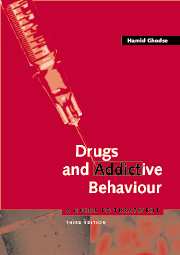Book contents
- Frontmatter
- Contents
- Preface
- Introduction
- 1 Drugs, addiction and behaviour
- 2 Drug dependence in the UK – and elsewhere
- 3 Drugs of abuse and dependence
- 4 Alcohol
- 5 Assessment
- 6 General measures of intervention
- 7 Specific methods of treatment
- 8 Complications of drug abuse and their treatment
- 9 Special problems
- 10 Follow-up and treatment outcome
- 11 Prevention of drug abuse
- 12 The law and drug control policies
- Appendices
- References and further reading
- Index
11 - Prevention of drug abuse
Published online by Cambridge University Press: 06 January 2010
- Frontmatter
- Contents
- Preface
- Introduction
- 1 Drugs, addiction and behaviour
- 2 Drug dependence in the UK – and elsewhere
- 3 Drugs of abuse and dependence
- 4 Alcohol
- 5 Assessment
- 6 General measures of intervention
- 7 Specific methods of treatment
- 8 Complications of drug abuse and their treatment
- 9 Special problems
- 10 Follow-up and treatment outcome
- 11 Prevention of drug abuse
- 12 The law and drug control policies
- Appendices
- References and further reading
- Index
Summary
Introduction
In the light of our knowledge of the consequences and complications of drug abuse, of the difficulties of treatment, and of the high mortality rate, the old adage, that prevention is better than cure, is beyond dispute. For drug-related problems, the value of prevention goes way beyond the individual benefits it confers, important though these are for the people whose lives are thus preserved. Prevention is also crucial for society as a whole and this is more apparent now than ever before. Drug trafficking, associated as it is with organized crime on an enormous scale, can threaten the very fabric of society by undermining law and order and the economy. In addition, the advent of AIDS, which is probably the most serious threat to the health of the world population since the Black Death, has made the prevention of drug abuse by injection relevant to everyone. No longer can drug dependence and abuse be shrugged off and ignored by those who are not affected; it is now in the immediate interest of everyone in the community that effective preventive measures should be adopted.
Although the need for prevention is clear, the best course of action is not. Because the causes of drug abuse are multiple, interrelated and multidimensional, its prevention is similarly complex. Unlike an infectious disease, there is no single causative factor to be opposed or countered by a single preventive measure, and it has proved very difficult to identify and assess which factors among many might be susceptible to preventive intervention.
It is not surprising, therefore, that different cultures and societies choose and employ quite different preventive measures, and that these will need to vary in response to new trends in drug abuse.
- Type
- Chapter
- Information
- Drugs and Addictive BehaviourA Guide to Treatment, pp. 366 - 380Publisher: Cambridge University PressPrint publication year: 2002



